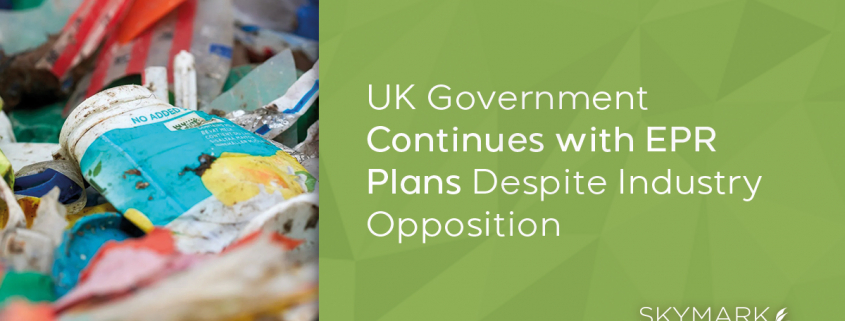The UK government is pushing ahead with its Extended Producer Responsibility (EPR) plans, despite opposition from some industry groups. The Department for Environment, Food and Rural Affairs (Defra) has recently issued a reminder about reporting requirements for EPR, which have come into force. EPR means that most existing obligated businesses, including many in the packaging industry, must collect data for the revamped packaging producer responsibility system, and pay for the cost of waste collections.
EPR will make firms that supply household packaging more responsible for the costs of dealing with packaging waste, moving costs away councils and council taxpayers. This system will encourage businesses to increase their use of recyclable materials, shifting costs away from the taxpayer and supporting efforts to protect the environment from waste. The data gathered this year will provide the basis for establishing the packaging waste management fees individual producers will pay in 2024 when the new packaging EPR system comes into force.
Despite opposition from some industry groups, such as the British Retail Consortium (BRC), Defra remains committed to working with producers on waste and recycling reforms. The BRC represents the largest UK retailers and has called on the Prime Minister to intervene on both EPR and the deposit return scheme (DRS), claiming that the two schemes combined will add around £4 billion in costs to retailers, which will be passed down the line. Defra has already reduced costs of its business waste proposals from £2.7 billion to £1.4 billion, following industry feedback.
Defra has insisted that EPR is still on track to be delivered from 2024, but it will remain in talks with producers as the final design of the scheme and delivery plans are developed. The department has listened to feedback from industry and removed its business waste proposals, reducing costs from £2.7 billion to £1.4 billion. The plans for EPR, which will come into force from 2024, play a key part in delivering the government’s goals of preserving the stock of material resources by minimizing waste, promoting resource efficiency, and moving towards a more circular economy.
Deep Sagar, Chair of the Advisory Committee on Packaging, said that packaging materials that are not recycled back into new packaging harm our natural environment. Councils have to spend more managing that waste, and the public cannot enjoy spaces such as parks and high streets as they should. EPR will reduce that waste. It will make goods producers pay for collection of all packaging waste, encouraging them to reduce or recycle more packaging. EPR could be a game-changer, reducing the impact packaging has on the environment by regulating material use and increasing recycling.
It must serve all – producers, local and central government, recyclers, and the public. The introduction of an EPR for packaging could be a game-changer. If done effectively, it could reduce the impact packaging has on the environment by regulating material use and increasing recycling.
Claire Shrewsbury, Director of Insights and Innovation at the Waste and Resources Action Programme
Defra has highlighted that the plans featured in the 2018 Resources and Waste Strategy, which set out how the government will preserve our stock of material resources by minimizing waste, promoting resource efficiency, and moving towards a more circular economy. In the plan, the government committed to several actions, including the introduction of an EPR scheme for packaging. The revenue generated will support better local council services and ensure that households can all recycle the same packaging materials.
Defra has said that the EPR system will help stop packaging waste being burnt and encourage businesses to use more recyclable materials, shifting costs away from the taxpayer and supporting efforts to protect the environment from the scourge of waste. This is part of wider waste reforms introduced by the government, including bans on more single-use plastic items, a deposit return scheme for drinks containers, and consistent recycling collections for households and businesses, on top of targets for recycling packaging waste.
However, industry lobbying has been growing in recent weeks as the 2024 EPR deadline nears, and fears over Scotland’s DRS also rise. Many have expressed frustrations during Defra’s visionary sprint groups over the lack of detail in the short-term. Producers in Scotland have also been publicly calling for the DRS to be delayed, and the Scottish government has softened large parts of the regulations. Reports over the weekend suggested that small producers could be exempt completely in the early years of the scheme.
The BRC’s letter to the Prime Minister marks the latest attempt from some producer groups to pressure the government over parts of the proposals amid the cost of living crisis. In August 2022, the department denied suggestions from the Food and Drink Federation that the plans would add £60 to shopping bills. The FDF, whose members include large producers such as Coca-Cola and Unilever, called on ministers to pause the plans, which would be an “easy win” for consumers already facing higher costs.
Defra has confirmed that obligated packaging producers in England, Northern Ireland, and Scotland must collect information on the amount and type of packaging they have supplied during 2023. Wales will follow shortly. Producers with a turnover of greater than £2 million and who handle more than 50 tonnes of packaging each year must also report this information to the Environment Agency twice a year. The first reports must be submitted from 1 October 2023.
In conclusion, the UK government’s EPR plans have been met with opposition from some industry groups, but Defra has remained committed to working with producers on waste and recycling reforms. The EPR system aims to encourage businesses to use more recyclable materials and reduce the costs of waste management for councils and taxpayers. The data gathered this year will provide the basis for establishing the packaging waste management fees individual producers will pay in 2024 when the new packaging EPR system comes into force. While there are concerns from some industry groups about the costs of EPR, the government believes that it will help to preserve the stock of material resources, minimize waste, promote resource efficiency, and move towards a more circular economy.








